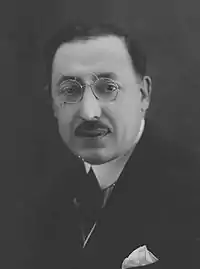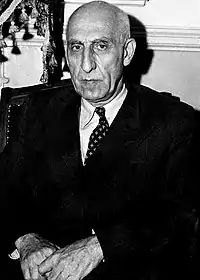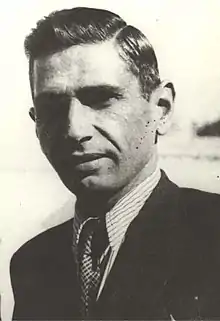1947 Iranian legislative election
Parliamentary elections were held in Iran in 1947. The newly elected parliament was opened on 17 July.[4] The election was a three-way power struggle between Ahmad Qavam, Mohammad Reza Shah and pro-Britain conservative politicians.[5]: 240
| |||||||||||||||||||||||||||||
All 137 seats to the National Consultative Assembly | |||||||||||||||||||||||||||||
|---|---|---|---|---|---|---|---|---|---|---|---|---|---|---|---|---|---|---|---|---|---|---|---|---|---|---|---|---|---|
| |||||||||||||||||||||||||||||
| |||||||||||||||||||||||||||||
Prime Minister Qavam's control over electoral machinery was in many districts challenged by "Imperial Iranian Army officers, independent local magnets and pro-British provincial governors".[5]: 240–241
A public protest by shopkeepers, bazaaris and university students and headed by Mohammad Mosaddegh among other politicians was held to call for a free elections, however, despite Qavam's promise to hold a free election, it was "rigged" and his Democrat Party of Iran won the majority, including all 12 seats in Tehran.[5]: 240–241
Fraction members
| Fraction | Seats | Leader(s) |
|---|---|---|
| Democrats | 80 | Mohammad-Reza Hekmat (conservative wing) Mohammad-Taqi Bahar (intellectual right-wing) |
| National Unionists | 35 | Ezatollah Bayat, Ardalan and Matin-Daftari |
| National Caucus (pro-British) | 25 | Madani and Taheri |
| Source: Abrahamian[5]: 242 | ||
References
- Mohammad Mosaddegh, though not a member of the parliament, led the main opposition.[2] National Front was established in 1949 and hence was not present in the election. Most opposition members were Iran Party former members who split to Iran Unity Party after its alliance with Tudeh Party and Azerbaijani Democratic Party.[3]
- گاهنامه پنجاه سال شاهنشاهی پهلوی [Chronology of the fifty-year Pahlavi Kingship] (in Persian). Vol. 1. Paris: Soheil Press. 1986. p. 408.
- Ro'i, Yaacov (1974). From Encroachment to Involvement: A Documentary Study of Soviet Policy in the Middle East, 1945–1973. Transaction Publishers. p. 44. ISBN 1412824117.
- Matini, Jalal (2009). نگاهی به کارنامه سیاسی دکتر محمد مصدق [A Glance at the Political Career of Dr. Mohammad Mosaddeq] (in Persian). Los Angeles, CA: Ketab Co. p. 179. ISBN 978-1595842268.
- Dieter Nohlen, Florian Grotz & Christof Hartmann (2001) Elections in Asia: A data handbook, Volume I, p67 ISBN 0-19-924958-X
- Abrahamian, Ervand (1982). Iran Between Two Revolutions. Princeton Book Company Publishers. ISBN 0-691-10134-5.
Further reading
- Parliamentary Politics in Revolutionary Iran: The Institutionalization of Factional Politics (Hardcover) (Publisher: Gainesville: University Press of Florida, ©1996.) ISBN 978-0-8130-1461-6


